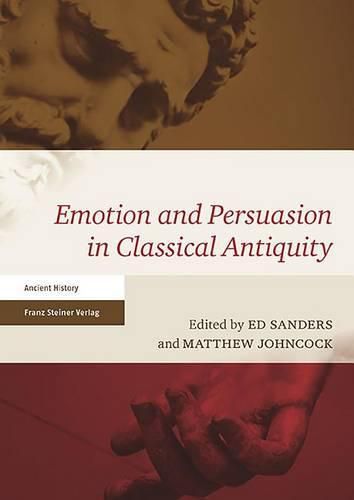Readings Newsletter
Become a Readings Member to make your shopping experience even easier.
Sign in or sign up for free!
You’re not far away from qualifying for FREE standard shipping within Australia
You’ve qualified for FREE standard shipping within Australia
The cart is loading…






Appeal to emotion is a key technique of persuasion, ranked by Aristotle alongside logical reasoning and arguments from character. Although ancient philosophical discussions of it have been much researched, exploration of its practical use has focused largely on explicit appeals to a handful of emotions (anger, hatred, envy, pity) in 5th-4th century BCE Athenian courtroom oratory. This volume expands horizons: from an opening section focusing on so-far underexplored emotions and sub-genres of oratory in Classical Athens, its scope moves outwards generically, geographically, and chronologically through the Greek East to Rome. Key thematic links are: the role of emotion in the formation of community identity; persuasive strategies in situations of unequal power; and linguistic formulae and genre-specific emotional persuasion. Other recurring themes include performance (rather than arousal) of emotions, the choice between emotional and rational argumentation, the emotions of gods, and a concern with a secondary audience: the reader.
$9.00 standard shipping within Australia
FREE standard shipping within Australia for orders over $100.00
Express & International shipping calculated at checkout
Appeal to emotion is a key technique of persuasion, ranked by Aristotle alongside logical reasoning and arguments from character. Although ancient philosophical discussions of it have been much researched, exploration of its practical use has focused largely on explicit appeals to a handful of emotions (anger, hatred, envy, pity) in 5th-4th century BCE Athenian courtroom oratory. This volume expands horizons: from an opening section focusing on so-far underexplored emotions and sub-genres of oratory in Classical Athens, its scope moves outwards generically, geographically, and chronologically through the Greek East to Rome. Key thematic links are: the role of emotion in the formation of community identity; persuasive strategies in situations of unequal power; and linguistic formulae and genre-specific emotional persuasion. Other recurring themes include performance (rather than arousal) of emotions, the choice between emotional and rational argumentation, the emotions of gods, and a concern with a secondary audience: the reader.